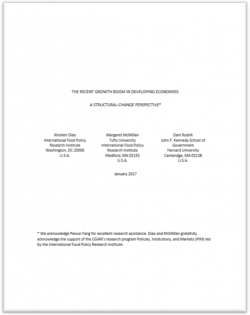Policy highlights:
- Statistics show that structural changes can lead to sustainable economy-wide growth. This study, which looked at data from 30 developing countries and 9 high-income countries, found that growth depends on: 1) structural changes (the rate at which resources – principally labour – can migrate from traditional low-productivity sectors like agriculture to modern high-productivity sectors like manufacturing) and 2) productivity within sectors (productivity growth in emerging sectors is a requirement for, and indicator of, long-term sustainable development, as well as a requirement for the adoption of surplus labour from traditional sectors; although agriculture can, and has, brought growth, it has its limits).
- Within-sector productivity growth is a key factor in the recent growth boom, and is particularly relevant to long-term growth. Structural change (moving labour from low to high-productivity sectors) is also a key determinant of growth, but mostly in the early stages of transformation.
- In Africa and Latin America, industrialization has not always contributed significantly to economic growth; agriculture is seen as the most important sector – not only on its own account, but also as a driver of growth-increasing structural change.











